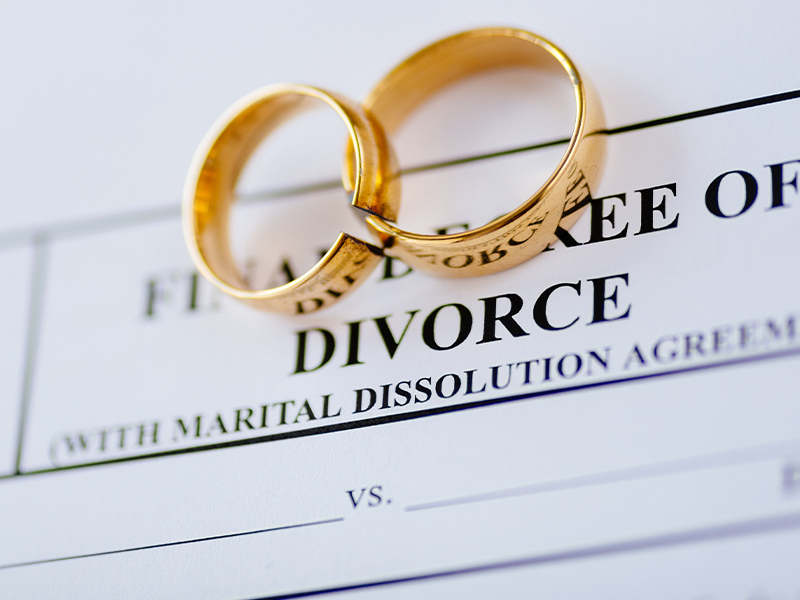Breaking up is hard whether it’s a “conscious decoupling” or an acrimonious split. But an expat divorce in Singapore adds a whole other level of complexity. Here, Singapore legal experts walk us through how to apply for divorce in Singapore – from selecting a divorce lawyer, to filing for divorce and jurisdiction, splitting assets, child custody, mediation and more.
How to apply for divorce in Singapore: The first steps
KALIDASS MURUGAIYAN, founder of Kalidass Law Corporation, is a criminal and divorce lawyer with years of experience dealing with divorce and criminal law matters. He explains that if you’re wondering how to apply for divorce in Singapore, you will have jurisdiction to file a writ against your spouse here if you’ve been married for at least three years. In addition, you or your spouse must have been living in Singapore for three continuous years immediately prior to the divorce, or your spouse is a Singapore citizen. To establish this, you’ll need to provide details of habitual residence.
The law governing divorce in Singapore is The Women’s Charter 1961. Either party to a marriage may file for divorce on the basis that the marriage has irretrievably broken down by meeting one of five grounds for divorce. These are adultery, unreasonable behaviour, desertion for a continuous period of at least two years, separation for a continuous period of three years (by agreement), or separation for a continuous period of four years.

As an expat, it’s also worth getting legal advice on whether filing in your home country or country of marriage is more appropriate. “Remember, too, that if you have children under 21, attending a mandatory parenting programme is a must before filling for divorce,” says Kalidass. Once you’ve done this, you’ll be issued a certificate of completion which will need to be filed with the divorce papers. “Divorce proceedings are commenced by filing a writ for divorce together with a statement of claim and statement of particulars, a parenting plan and a matrimonial property plan.” The Court will then conduct a mediation in person with both sides.
Throughout the proceedings, the Judge has a duty to consider the possibility of reconciliation. If appropriate, the Court may give parties the opportunity to consider this option.
Kalidass Law Corporation
#23-06 SBF Center Singapore, 160 Robinson Road
6345 5001 | daslaw.com.sg
Contested vs uncontested divorce proceedings
JIN POH LIAW of Tan Lee & Choo is a divorce lawyer and mediator with over 30 years’ experience in litigation and family law. He explains that the person initiating the divorce (plaintiff) details how the marriage broke down in the Statement of Particulars (SOP). The spouse is the defendant.
In a contested divorce, the defendant contests the plaintiff’s SOP by filing a Defence and/or Counterclaim. The Defence sets out the defendant’s denials of the plaintiff’s SOP. The Counterclaim contains the defendant’s version of events of how the marriage broke down.
A contested divorce is expensive and tedious. “It’s also emotionally draining as all unhappy marital issues will be rehashed, with unforgiving and harsh cross-examination of all witnesses,” says Jin Poh.
On the other hand, an uncontested simplified divorce is “straightforward, fast and cost-effective, as parties have agreed on all the issues,” says Jin Poh. One type of uncontested divorce is when the defendant, on receiving the plaintiff’s SOP, indicates they are not contesting the claim for dissolution of the marriage. Another type is when the parties, through mediation and negotiations, make changes to the SOP, Defence and/or Counterclaim to reach agreement. In both examples, the interim judgment will be granted with the ancillary matters to be heard later.
According to Jin Poh, the benefit of uncontested divorce is that “when the papers are properly prepared, the interim judgment and final judgment can be obtained within four months from the date of filing”.
Tan Lee & Choo
#04-04 People Park Complex, 1 Park Road
6535 6077 | tanleeandchoo.com.sg
Mediation in expat divorce in Singapore
MICHELLE WOODWORTH has over 25 years of experience as a family litigation and divorce lawyer. This includes serving as a Family Court District Judge, mediation advocate and Principal Mediator with the Singapore Mediation Centre.

Generally, mediation is an alternative dispute resolution method to court adjudication. A neutral third-party mediator or co-mediators will facilitate negotiations between disputing parties with a view to achieving a consensual outcome, explains Michelle.
When used in divorce, mediation aims to provide spouses with a safe space to discuss and reach an agreement on the issues in their divorce. “These issues include the reasons for the breakdown of the marriage, custody and care arrangements, maintenance for the children and wife and/or incapacitated husband, and division of the matrimonial home and assets,” says Michelle.
If there are children below 21 years of age, and if matters can’t be resolved prior to filing divorce proceedings, mediation facilitated by the Family Justice Courts at the Child Focused Resolution Centre (CFRC) is mandatory. The focus of CFRC mediation will be on the needs of the children post-divorce. The issues of custody, care and access are all considered to be of utmost importance.
Unlike court-based mediation, divorcing couples may voluntarily attend mediation. This can be at the Singapore Mediation Centre, the Law Society Family Mediation Scheme or before a private accredited mediator. “This is encouraged to be done before any proceedings are commenced in court so that parties can hopefully reach an amicable agreement,” says Michelle.
Quahe Woo & Palmer LLC
#02-02 Haw Par Centre, 180 Clemenceau Avenue
6622 0366 | qwp.sg
Protecting yourself financially during divorce in Singapore
SARAH-MAE THOMAS, is a Singapore and Australia qualified lawyer, and Managing Director of Sarah-Mae Thomas LLC. The firm specialises in family law and juvenile matters, with an international focus.
According to Sarah-Mae, knowing how to apply for divorce in Singapore and navigating the process involves taking necessary measures to ensure financial protection, especially for EP holders and trailing spouses. She explains it is important to do the following:
#1 Acknowledge the differences in Singapore divorce law compared to the law in your home country. Crucial to financial protection is understanding your rights and obligations in areas like property division, child support and spousal support.
#2 Assess joint accounts by taking stock of shared finances. This is to make sure that your spouse is not dissipating shared monies without your knowledge.
#3 Update legal documents such as wills and insurance policies to reflect your new circumstances and intentions. This ensures that your assets are distributed in line with your current wishes.
#4 Most importantly, consult a family lawyer. Their expertise in Singapore law can provide specific guidance tailored to your individual situation. Proper legal advice is key to making informed decisions and protecting your financial interests during this challenging time.
By following these simple steps, “you can navigate the complexities of expat divorce in Singapore, with a clearer understanding of your rights and securing a more stable financial future ahead,” says Sarah-Mae.
Sarah-Mae Thomas LLC
#08-168 The Central (Soho 2), 12 Eu Tong Sen Street
6011 6767 | sarahmaethomasllc.com

Division of property and assets
Fortis Law Corporation is a boutique private client firm, attuned to resolving disputes for individuals. HO CHEE JIA is a specialist family and divorce lawyer with the firm and has over a decade of experience involving international issues in family law.
According to Chee Jia, the division of property and assets can be one of the most contentious issues in the divorce process. This is especially so in longer marriages – where finances and assets have become more intertwined, and also where there are assets in foreign jurisdictions. This makes it more complicated to determine how the law may govern these assets.
“There’s a common misconception that only assets in joint names are liable for division, but this is not the case under Singapore divorce law,” says Chee Jia. Generally, all assets that are acquired during the course of the marriage, even assets in one party’s name, are considered matrimonial assets and will be divided. There are a few exceptions such as pre-marital assets or inheritance, explains Chee Jia.
Under Singapore divorce law, division follows the guiding principle of reaching a “just and equitable” outcome. To achieve this, each party’s financial contributions and non-financial contributions towards a marriage are taken into account. This is unlike some other jurisdictions in the world where the starting point for the division of assets is equal division.
The differing divorce laws in other countries can sometimes make expat divorce in Singapore more complicated. And the additional element of which jurisdiction’s laws apply comes into play. Selecting the right jurisdiction in which to obtain a divorce will have a crucial impact on how assets are divided. So it can become a hotly contested issue between expatriate divorcing couples. It’s best to get good legal advice so you know where you stand, says Chee Jia.
Fortis Law Corporation
#23-92 The Central Office Tower 1, 8 Eu Tong Sen Street
6535 8100 | fortislaw.com.sg
Maintenance for spouses and children in Singapore
Singapore law provides for spousal and child maintenance (financial support), during the marriage or as part of divorce proceedings, explains SIMRIN SINDHU. Simrin is a senior litigation and divorce lawyer at Amarjit Sidhu Law Corporation with more than 20 years of legal experience.
While the law provides for maintenance payment towards a wife or an incapacitated husband, “the duty to pay spousal maintenance is not automatic and many factors will be considered before making an order for spousal maintenance,” says Simrin. In Singapore, parents also have a legal duty to maintain their children until they turn 21 years old. Also, children over 21 who are still schooling or have physical or mental disabilities can apply for maintenance, she explains.
To make a claim for maintenance you’ll need to prove your spouse has neglected or refused to provide reasonable maintenance. If you haven’t yet filed for divorce, an application for maintenance for yourself or your child can still be made by making a Magistrate’s Complaint at the Family Justice Court.
The court will consider various factors including current expenses and salary, earning capacity, debts and liabilities. For child maintenance, the financial needs of the child, any physical or mental disability, the standard of living enjoyed, and the income and assets of the parents will be considered.
Women during divorce are advised to claim for nominal maintenance as The Women’s Charter does not allow a claim for maintenance if there’s no maintenance order already in place. However, this is not given as of right, and reasons must be presented to be entitled to a nominal maintenance order.
“Failure to comply with maintenance orders, can be enforced through the courts,” says Simrin. Maintenance arrears can also be recovered up to a period of three years prior to filing the application, she explains.
Amarjit Sidhu Law Corporation
#14-01 Chinatown Point, 133 New Bridge Road
6259 2460 | asl-law.com.sg

Prenuptial and post nuptial agreements
I.R.B. Law LLP is a full-service law firm that offers a wide breadth of legal services to private individuals and businesses of all sizes. As one of the partners and a divorce lawyer at I.R.B. Law LLP, AMEERA BAJRAI provides comprehensive legal representation to divorcing clients, including informed advice on realistic outcomes.
According to Ms Ameera, in modern times the practical couple needs to consider pre- or post-nuptial agreements. These agreements are no longer reserved for the wealthy but are essential tools for safeguarding your financial and emotional wellbeing, she says. “A well-drafted agreement offers a safety net by protecting assets in cases of divorce. It will also potentially save time, emotional distress, and costly legal fees.”
These agreements have a significant role in preserving family wealth and legacies. “They secure the financial future of spouses and future generations by specifying asset distribution if divorce occurs,” says Ms Ameera. Importantly, if drafted well, they can also extend to address child custody and support, and establish a plan for children’s care and financial well-being.
Pre- and post-nuptial agreements in Singapore are more than preparations for worst-case scenarios. They aim to secure the best future for couples and their families. “As these agreements are not binding, but are highly persuasive if done in a fair manner, couples intending to marry or already married are encouraged to draft an agreement with us,” advises Ms Ameera. It will give you peace of mind and allow you to focus on nurturing a harmonious and fulfilling marriage. And you’ll be safeguarding your financial and emotional wellbeing in the event of a divorce.
I.R.B. Law LLP
6298 2537 | irblaw.com.sg
Child custody, care and control
Derrick Soh Law Corporation was founded in 2021. It offers practical legal guidance on family law, personal injury claims, probate and other legal disputes. SAMANTHA SOH, divorce lawyer and counsel at the firm, is well-versed in the practice of family law. She has represented clients in a wide variety of divorce cases including but not limited to child-related and relocation applications.
According to Samantha, joint custody is generally the norm unless you can show that a parent has neglected or abused the child. “Joint custody requires parents to make joint decisions on three major aspects of the child’s life – education, religion and healthcare,” she says.
“A care-and-control order is granted to the parent who is the primary caregiver of a child. That parent will make the day-to-day decisions on behalf of the child.” For instance, that parent takes care of the child’s daily necessities like food, transport and bedtime.
The parent without care and control will have visitation rights to the child. “The amount and type of visitation varies – from a “reasonable” amount to there being only limited, supervised visitation,” says Samantha. Visitation, also known as access, can take place on weekdays, weekends and/or during school holidays. “What will be ordered depends on the child’s schedule and how access will best fit in. If in doubt, you should consult your lawyer on whether specific access timings are appropriate.”
Parents are free to agree on access timings for their children. “If they cannot agree, the Court decides for them on the basis of which schedule would be in the child’s best interests.”
Derrick Soh Law Corporation
77 High Street, #08-03, High Street Plaza
9810 2551| office@derricksohlawcorp.com
derricksohlawcorp.com

Family violence
VIVIENE SANDHU is an experienced family law advocate and divorce lawyer with over 25 years of experience. She is a lawyer at Clifford Law LLP, a full service law firm that’s been representing clients in a wide variety of legal matters in Singapore since 2005.
In July 2023, the Women’s Charter (Family Violence and Other Matters) Amendment Bill was passed. “It broadens the definition of family violence to encompass not only physical abuse, but sexual, emotional and psychological abuse,” says Viviene. The Bill also includes new provisions to empower the Court to better protect victims and to strengthen the rehabilitation of abusers.
Viviene stresses the significance of recognising these less apparent forms of abuse. Throughout her extensive career, she has encountered various abuses, apart from the obvious physical abuse, including:
- Verbal: Using demeaning language, constant yelling or screaming;
- Sexual: Engaging in non-consensual sexual activity or coercing a family member against their will;
- Emotional or psychological: Undermining self-worth, criticism, insults, or isolating a family member, making them feel alone and dependent on the abuser. Making constant calls to check on their whereabouts or withholding allowance are other factors taken into account.
“Establishing family violence requires careful consideration of evidence. While evidence of physical violence is relatively straightforward to obtain, in cases of other forms of abuse, it may be more challenging to gather,” says Viviene. This requires a critical and sensitive approach. Viviene understands the importance of guiding victims through this process with empathy and precision. She aims to help them break the cycle of violence with the help of the law.
Clifford Law LLP
#08-04 The Adelphi, 1 Coleman Street
6223 4456 | cliffordlaw.sg
Upcoming development: divorce by mutual agreement
JEREMY CHEONG is a partner at JCP Law LLC, a law firm in Singapore advising clients on a broad range of matters including litigation, international arbitration, corporate and commercial advisory, criminal defence, family and matrimonial law, probate and letters of administration, torts and employment.
Currently, the sole reason for divorce to be granted is the “irretrievable breakdown” of the marriage. This is usually proven through one of five scenarios – adultery, unreasonable behaviour, desertion, separation of three years with consent or separation of four years without consent. “With the introduction of divorce by mutual agreement there will be a new, completely neutral scenario that can be cited in divorce proceedings,” explains Jeremy. This new option allows couples to divorce without needing to prove fault or separation.
“It aims to reduce acrimony in divorce and better allow the family to heal and move on, especially when children are involved,” says Jeremy. Previously, even if parties had agreed to an uncontested divorce there may be disagreement on the reason for the breakdown of the marriage that could end up causing a dispute. “Likewise, if separation was used as grounds then both parties would be required to put their lives on hold for either three or four years to meet the timeline requirements.”
Parties filing for divorce by mutual agreement must agree that their marriage has broken down irretrievably and explain the reasons for their conclusion. “It’s also necessary to detail reconciliation attempts and considerations for their financial affairs and children (where applicable) after the divorce has concluded,” says Jeremy. Whilst this hasn’t yet come into force, it’s expected in the not too distant future.
JCP Law LLC
#11-01A, 6 Battery Road
6206 5200 | jcplaw.com.sg
Now you know how to apply for divorce in Singapore, why not take a break from it all and treat yourself to a night out?
This article first appeared in the December 2023 edition of Expat Living. You can purchase the latest issue or subscribe so you never miss a copy!
To make the most of living in Singapore, read our latest City Guide here for free!





